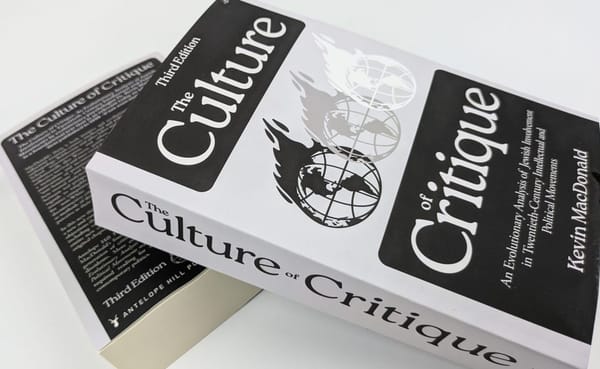Dominating Social Media For God and Country
Neglecting to participate online often means neglecting to participate at all.

How do people form their beliefs? What changes their minds? For Christians on the right to gain influence and power, we must learn to change minds, and we need to do it at a scale that is significant enough to make a real difference. In business, we call this “marketing,” but the general term for it is propaganda.
Propaganda
Every day we are inundated with a near constant stream of ads, each professionally designed and A/B tested to find the best driver of behavior, by maximizing emotional impact. They generate a sense of urgency, fear of missing out, sense of inclusion, a promise of peace, greed, anxiety, gluttony, lust, or anything that moves people to action. The psychological manipulation is constant.
This ad revolution began in the early 20th century with the rise of the father of modern propaganda, the Jewish nephew of Sigmund Freud, Edward Bernays. Armed with fledgling mass media, Bernays pioneered techniques to control behavior and beliefs of the masses by manipulation. Sometimes he formed official-sounding groups of experts full of people he specifically hired for this purpose. Speaking in unison, they offered their professional opinions on the topic he wanted to influence, and took advantage of the human tendency to trust experts and to believe consensus opinions. He pioneered meticulously planned techniques to conceal the advertisements as if they were part of the main event, like product placement in a movie or paid actresses smoking cigarettes in a parade.
This type of manipulation is used for more than selling products. It's used to shape minds. The same techniques are used by governments, NGOs, political activists, and religious groups to shift public opinion. An obvious example is public acceptance of sodomy. During the debates between Barack Obama and Hillary Clinton leading up to the 2008 election, Obama did not support gay marriage, ostensibly because less than 50% of the country supported it at the time. By 2024, only 16 years later, that number was around 70%. There were not substantial new debates that changed people's views rationally, but a blitz of public manipulation around TV and the Internet. A second example is from 1971, when the National Organization for Women (note the official-sounding name) organized a mass burning of religious head-coverings, apparently in widespread use at the time.¹ By the 1980's (only 10-20 years later), religious head-coverings had almost entirely vanished from Christian churches. Many of these churches never formally embraced feminism, but found strained and novel theological rationalizations to justify their putting away.
The Moral Formation of Propaganda
Pay attention to the methods behind propaganda, and you will never see the world the same again. Most people you meet are completely helpless to resist the professional manipulation they face on a daily basis, and most of their manipulation is to their great harm. People literally believe in propaganda more than they believe in God. After all, we have already seen they are willing to change their beliefs about theology and morality over it.
Nearly every political and religious problem we face as Americans is downstream from our moral compass. We pity the criminal and give him a second, third, or fourth chance but not the victims of their crimes and the homeowners forced to move away, which is manipulatively labeled "White flight." We import foreigners and subsidize their immigration so they can "have a chance at the American dream," while our own people struggle to raise families. Our churches maintain greetings of honor and reverential titles for heretical or activist leaders while leveling unrestrained attacks on those who are too far on the right or cling too hard to their church's standards. Nearly every major political problem we face in the nation and the church comes from a moral unwillingness to do what is necessary to solve the problem, and a stubborn insistence on solving problems, "the right way," i.e the way that never challenges the underlying morality and methods, and has proven ineffective when tried.
We should not be deluded into believing that merely changing minds is all that is necessary to gain power in the church and the state, but without at least some popular backing most political efforts will return empty. Therefore, our pressing need is to employ our own propaganda to influence the moral compass.
A Strategic Point of Entry
In Bernays' day, mass media was centralized into a few parent companies of radio, TV, print, and movies. The barrier to entry was high enough that they could control consensus by regulating who they allow through the gate. Any dissidents from the prevailing view could be easily marginalized by preventing or revoking access to the production studio. As the internet has risen in popularity and the cost of digital production tools have reached consumer prices, the capacity to gatekeep has declined so much that ordinary people every day achieve audiences that exceed those of legacy media.
In my first American Mantle article, I spoke of the importance of rhetorical dominance for persuasive right-wing speech. In this article, I want to share some methods to help my right-wing readers to punch above their weight classes on social media.
Integrity
The main thing that you bring to social media is yourself. Mere information is available anywhere, but people listen to you because of the human element you bring to the topics you discuss. All the value you bring is mediated through your personality and your degree of trust. Just like a character in a book, you are a character in someone else's social media narrative and as such have access to their emotions.
In a world of manipulation, those who would counter manipulation must themselves have integrity. The internet is full of grifters who jump from fad to fad to promote themselves. A big part of your influence is tied to your credibility that you are someone worthy of respect and worthy of an audience. People are so used to artificiality that meeting genuine people who are also interesting is refreshing.
Integrity is more than moral goodness. It is wholeness, completeness, or agreement. You are to be the same person online as you are offline. Not to discourage anonymity, which may be wise for your circumstances, but rather to actually live out the persona you project. Even as an Anon, you should still be true to your own values. You may aspire to higher virtues than you achieve, but you can still speak of them in a way that retains humility and does not project characteristics you do not embody. If you lack the virtues you promote, you make yourself a hypocrite, harming your cause, yourself, and others.
Audience Orientation
Most people consume social media to combat boredom. To gain attention, you must offer something interesting, which implies some knowledge of your audience. Whether sympathetic, hostile, or neutral, you can still be interesting in your own way. What do you bring to the internet that others don't? Consider the situation and bring what only you can bring: humor, gravity, peacemaking, provocation, authority, curiosity, sobriety, intensity. Avoid making the "easy joke." Avoid being annoying, or overstaying your welcome unless for strategic reasons.² In a hostile environment, assert dominance to win the crowd. It is generally better to attack than defend. Insult the enemy personally, impugn their motives, mock their argument. In a neutral environment, show yourself to be not half the "monster" they would imagine. In a sympathetic environment be "relatable" and the kind of person people would enjoy having a meal or a drink with. In general, err on the side of boldness and action, and if you make a mistake you can apologize later.
Repeat Exposure
Advertisers understand that repeat exposure to the same ads over and over will tend to drive interest. They understand the need to "have an opinion" on things that dominate attention. Thus to cause a topic to dominate discourse you must give repeat exposure. It takes advantage of a human bias to associate repeat experiences as representative of the big picture. A simple example of this dynamic in action is the manipulative media narrative of police violence against Blacks. By narrowly reporting only when a Black person dies in a police encounter, it creates the misleading public perception that police routinely kill Blacks. Statistically, this is nonsense³ but huge numbers of well-meaning people see this as an active political problem that needs solving. This is the power of selective repetition. Imagine if instead you drive the narrative by daily sharing problems with a right wing significance, like Black crime, Indian labor fraud, or Jewish debauchery? Or in religious contexts, examples of right and wrong applications of the law and the gospel, or the examples of liberal pastors in conservative churches? The things you talk about set the agenda.
Taboos
Taboos in a healthy culture serve an important role protecting morality and safety by coupling social shame with harmful acts. Submissive people (which make up the majority) look to others to understand the range of what is acceptable. Though it is hypocritical, they will conduct themselves differently in a casino or at a wild party than they would in polite company because the taboos are suspended in those settings.
This means that dominant people have the capacity to shatter taboos. Consider how wild it is that something as disgusting as sodomy, which causes incontinence, bleeding, and AIDS has gained such a high approval rating in mere decades. First they paraded around the streets in leather fetish outfits, then they "tamed" it down to the metrosexual stereotype, until finally embracing a suburban family man stereotype.
In our day, we have taboos that prevent us from solving political problems: taboos against the death penalty, against strong policing measures, against racism, opposing immigrants, hating Islam, or identifying the sins of Jews.
When you openly and relentlessly talk about these issues without a hint of shame or nuance, you desensitize people to the associated taboos, and thus create room for action. Submissive people will naturally tend towards the center of perceived public opinion. If you break taboos on the right, the entire center moves right and they will feel less comfortable "taking sides" against your inclusion.
Consensus and Reinforcement
Similar to the concept of taboos, people judge ideas in part by their perception of consensus opinion. The infamous Asch conformity experiments planted actors to pretend to be test subjects performing a simple and obvious picture-matching task, but the actors were told to deliberately give the same wrong answers, and they found that 74% of people would follow the consensus opinion of the group even against their own eyes (when the actors told the truth less than 1% made an error). But in the presence of a single dissenting actor, that number dropped to 5%. People felt they had permission to believe the truth when they saw even one other person who vocalized their view.
Our lesson is that it is not a waste for you to be the lone voice of dissent on a given subject. Even a simple comment like, "Why is that a good thing?" or "Haven't we already tried that?" can prove devastating to consensus. Similarly, make a habit of regularly commenting "Good point," or answering the same answer as others if you are doing so just to amplify and encourage.
Substance
Although dominance, rhetoric, and consensus drive the lion's share of power in social media discourse, you must be sure to have depth, coherence, and substance to back it up when it is needed. Without any substance it becomes empty hot air. People need to know that your confidence is warranted and that you are not an arrogant blowhard. You also need to subject your thinking to legitimate challenges so that you can hone your mind and refine the rough areas of your ideas. Too much rigor is alienating, but quietly learning in private and giving your digested results in simple terms in public will both increase your own knowledge and reinforce your credibility. There are libraries full of books that people are not reading because they are not interested in spending their 10 minute bathroom break on their phone reading about the technical and academic details that interest nerds. Keep formal and academic writing for an appropriate setting, but do enough work to be credible.
Responsibility
Our interest in counter-propaganda may be its own form of propaganda, but our intention is never to manipulate. Consciously employing techniques that have the capacity to manipulate carries severe danger if we are not responsible. Like a loaded firearm, we must respect the power and danger of our tools even though we consider them worthy to master. Only a childish and immature person feels the need to debate every subject for the satisfaction of winning or his own intellectual entertainment. Our words have the power to make people feel guilty or innocent, and this relative power over the conscience must be stewarded well. It is good for the evil person to feel guilt and the righteous person to feel encouragement, so you must fear God and respect the value of men when you consider using these tools. Done right, they are just another form of leadership, but done wrong, you risk wrongfully abusing people or granting people confidence as they self-destruct. In some cases, you will make mistakes and the general case is that you should apologize and, if it would be wise, publicly vindicate them, but you must use good discernment. Some hypocrites will play the lawyer to nitpick you into apologizing publicly as a form of submission and humiliation ritual and you should not play into that game. Yet the principle still remains. This is a part of your integrity.
Conclusion
The typical Christian attitude towards social media ranges from caution to outright hostility. We are constantly warned about dangers like phone addiction, explicit content, or unrestrained speech, but never warned against missed opportunity, as if the sudden windfall of a thousand people's attention is a liability and it would be best if we didn't have it at all. If 300 people came to a church worship service, church leaders would be beside themselves with the success of the outreach, yet a single idea, written in 90 seconds can gain the attention of 20,000 people in a single afternoon on social media. A word fitly spoken is like apples of gold in a setting of silver, and the power of social media to amplify these words is too valuable of an opportunity to miss.
Neglecting to participate online often means neglecting to participate at all. If you never post, comment or like anything online, that void will be filled by those who lack your values. I fear in some cases that the allergy to online discourse stems from preoccupation with one's own affairs without concern for civic duty to our church or nation. Will you be like Hezekiah, who knew the doom of his people but was satisfied that there would be peace in his own day? You have tremendous opportunity, so be strong and courageous! Pray for God's blessing and go put this into practice. I will see you there.
Footnotes
- https://documents.alexanderstreet.com/d/1000683017 Excerpts from Elizabeth Farians, "NOW Papers on Women and Religion," self-published pamphlet, c. 1971-72. 4 pp.
- An example where it may make sense to be intentionally annoying is if your goal is for people to quit or leave a group. If a group blows up with conflict to the point of being annoying, many people will leave the group and it can ruin the group altogether, which may be helpful in reducing the organization of an enemy.
- Less than 250 black men are killed by police per year compared to an estimated 10M-15M encounters. That is an average of 5 per state. More than 99% are legally justified. To put this in perspective, this means the vast majority of police departments kill zero black people per year for any reason and in order to claim there is a problem with policing, you would first need to change the legal definition of justified force. Whether a black is armed or not is irrelevant since it would require a police officer to be omniscient and he has not searched the suspect. He has to make decisions based on split second observations and has to treat violent actions, like charging the officer, or quickly reaching into his clothing and drawing his hands out as threats, which is why he will be shouting instructions specifically on how to avoid getting shot. Even so, nearly 3/4 of those killed by police are armed.
ATTENTION READER: We need your help.
Institutional trust is at record lows. But without institutions, we cannot renew our people, much less provide an inheritance to posterity. In response to this crisis and as an organic outgrowth both of necessity and natural interest, American Mantle exists. And so we make our appeal.
Donate to the Cause. Help us reach our monthly goal in order to solidify this crucial institution.







